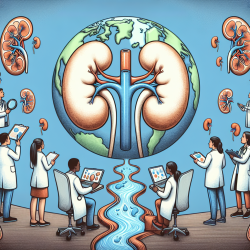Introduction
Chronic Kidney Disease (CKD) is a growing global health challenge, affecting approximately 850 million people worldwide. The research article titled "Kidney Health for Everyone Everywhere—From Prevention to Detection and Equitable Access to Care" provides crucial insights into the prevention, detection, and management of CKD. This blog will explore how practitioners can leverage these insights to improve their skills and contribute to better health outcomes for patients.
Understanding CKD Prevention and Detection
The research highlights the importance of a multi-tiered approach to CKD prevention:
- Primary Prevention: Focuses on preventing the onset of CKD by managing risk factors such as diabetes and hypertension. Practitioners should encourage lifestyle modifications, including a balanced diet and regular exercise, to mitigate these risks.
- Secondary Prevention: Involves early detection and intervention to slow CKD progression. Regular screening for high-risk groups, such as those with a family history of CKD, is crucial.
- Tertiary Prevention: Aims to manage established CKD and prevent complications. This involves comprehensive care plans, including pharmacotherapy and patient education.
Equitable Access to Care
The research underscores the disparity in CKD care across different regions, particularly in low- and middle-income countries. Practitioners should advocate for equitable access to diagnostic tools and treatments. Collaborating with policymakers to integrate CKD care into national health agendas can help bridge these gaps.
Implementing Research Outcomes
Practitioners can enhance their skills by implementing the following strategies based on the research findings:
- Adopt Preventative Interventions: Encourage patients to adopt healthy lifestyle changes and provide education on CKD risk factors.
- Promote Early Detection: Implement routine screenings for at-risk populations to identify CKD in its early stages.
- Advocate for Policy Changes: Work with healthcare organizations to promote policies that ensure equitable access to CKD care.
Encouraging Further Research
While the current research provides valuable insights, there is still much to learn about CKD prevention and management. Practitioners are encouraged to engage in further research to explore innovative solutions and interventions. Collaborating with academic institutions and participating in clinical trials can provide opportunities to contribute to the evolving body of knowledge on CKD.
Conclusion
By implementing the outcomes of this research, practitioners can play a pivotal role in improving kidney health outcomes globally. Emphasizing prevention, early detection, and equitable access to care are critical steps in addressing the CKD burden. For more detailed insights, practitioners are encouraged to read the original research paper, Kidney Health for Everyone Everywhere—From Prevention to Detection and Equitable Access to Care.










